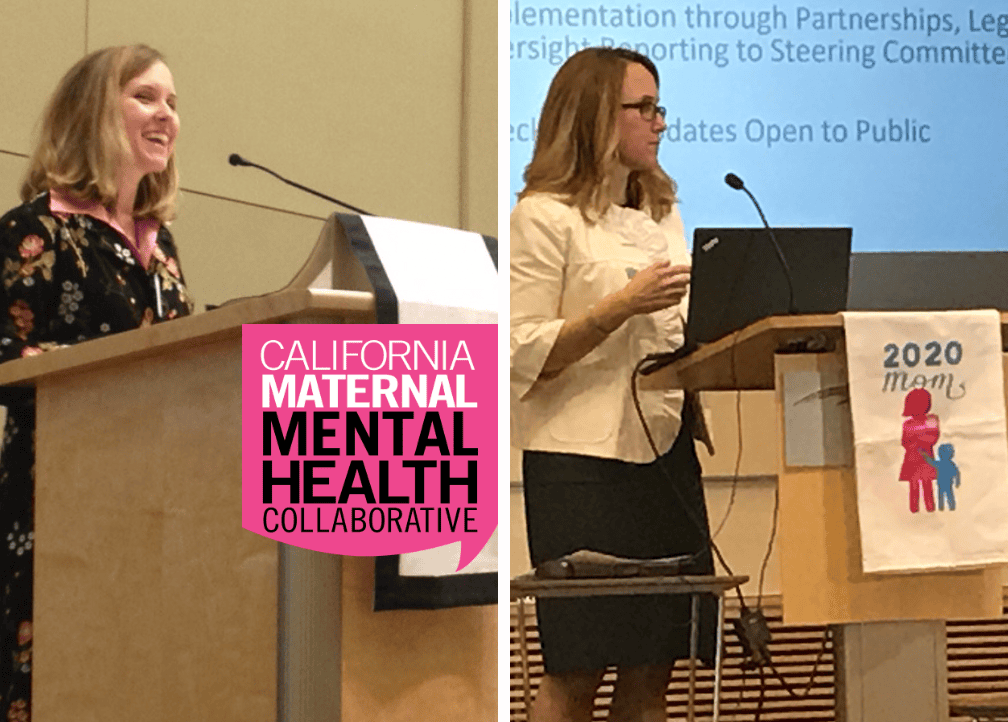About Us
mission & vision
Mission: To close gaps in maternal mental health care.
Vision: All pregnant and postpartum mothers have ready access to standardized, evidence-based maternal mental health care from providers they respect and trust.

We began this work in 2011 when maternal mental health was simply referred to as “postpartum depression”
Diagnosis and treatment rates were not measured, and the healthcare system was silently failing tens of thousands of mothers and families in the U.S. a year.
Only
15%
Of moms receive professional help

to close gaps in maternal and mental health care
The problem we’re here to solve
Maternal Mental Health disorders, which are the most common complication of pregnancy, impact, on average, up to 1 in 5 of the expecting and postpartum mothers in the U.S., mothers of color suffer at higher rates.
Though awareness of these disorders has increased substantially, most screening, diagnosis, and treatment is still not standardized and routine across the U.S. health delivery system.
strategic plan
How we’re changing the system

Our Focus
While our first 10 years focused on elevating maternal mental health and identifying the complex barriers, our next 10 years will focus on doubling down on the implementation of solutions. We looked at our unique strengths and assets, where gaps remain in the field, and how we can line up our strengths to tackle them. To that end, from 2022-2025, we will focus on three areas, which we call our
“3 As:”
- – Access to Providers & Programs
- – Ample Insurance Coverage
- – Appropriate Screening & Treatment

What We Do
Critical Content
This strategy builds on the Policy Center’s track record of curating and communicating cutting-edge content to those we serve. This content is centered around the development of issue briefs and “State of the State of Maternal Mental Health in America” reports. Distribution of such content occurs through FORUM sessions, webinars, blogs, infographics (including graphic illustrations), storytelling, and social media memes and messaging.
Communities of Practice
We connect change agents working to solve the same problems or who work in similar settings to learn how to close gaps in maternal mental health care efficiently and together.
These communities may include our fellowship programs and the further development of the maternal mental health LinkedIn groups, for example.
Certain communities of practice could center around adopting the Policy Center’s “Whole Mom” standard checklists.
Co-Laboratory & Co-Laborations
Our Co-Lab is where implementation science comes to life. We experiment and test ideas with partners to find solutions that work (and don’t). We iterate on learnings and promote wide-scale adoption of solutions that work.
We collaborate with critical stakeholder organizations to support the adoption and scaling of solutions.
Commanding Action
Commanding Action means that the Policy Center will actively push for the adoption of solutions among stakeholder groups. Strategic tactics can include letters, petitions, and legislative and legal solutions.

Who We Influence
We put mothers at the center of our work. We directly serve, through both “push and pull” strategies, cross-sector leaders & change agents in the U.S.:
- – Healthcare systems/providers insurers/plans and benefit administrators
- – Non-profits
- – Government

Intended Outcomes
Availability of Providers
A broad range of qualified maternal mental health providers so evidence-based care options are readily available to mothers in the U.S.
Appropriate Screening
Obstetric providers adopt a standard protocol for screening, and they monitor screening rates and improved outcomes (reduced scores over time). We believe screening should occur early so interventions and care can be implemented quickly.
Ample Coverage
Private insurers and Medicaid plans provide timely access to in-network providers and care without requiring mothers and those who support them to jump through hoops.
This includes the promotion of payment reform to support mental health integration in obstetric/primary care and addressing benefit coverage limitations, utilization management prohibitions, and provider network restrictions.

What Makes Us Unique
Of the other organizations and leaders focusing on maternal mental health in the U.S., the Policy Center is most known for understanding the complex health delivery system, including how change can be driven through:
- – Integration of mental health care into medical health care
- – Provider payment strategy
- – Insurance/coverage benefit design, and
- – Provider networks
This understanding has helped the Policy Center lead the way in identifying the most pressing barriers to screening and treatment.
our impact
The Metrics
82%
Of Policy Center fellows implemented action plans for maternal mental health
1k+
Maternal Mental Health Providers certified
700
Cross Sector Change Makers Attending our Annual Forum
Our History
We began to shine a light on the problem, now we’re catalyzing lasting systems change

The Policy Center: Field Catalysts
In 2023, the organization was recognized as Field Catalysts and renamed the Policy Center for Maternal Mental Health. A new brand identity was adopted to define and depict the work we do:
- – Inform policy, including public policy & health delivery policy
- – Catalyze cross-sector players to advance change

Realizing Our Unique Position
In 2021, after 18 months of strategic planning work, a strategic framework was approved which acknowledged our unique position in the field: understanding of the complex U.S. healthcare system.

Making Progress: Bills Passed
2020 Mom sponsored bills that passed in the state of California the AB 2193 Maternal Mental Health Screening and Support and AB 3032 Hospital Maternal Mental Health.

Founded in 2011 as the California Maternal Mental Health Collaborative
After launching the national “2020 Mom Project” (which explained a path forward with easy action steps hospitals, providers and payers could take) and being referred to as the 2020 Mom Project, the Collaborative changed its name to “2020 Mom,” maintaining its focus on multi-stakeholder engagement and policy as a lever for change and laying a path forward for the entire country. Our aim was to shine a light on the problem, change the narrative from calling the range of disorders “postpartum depression” to “Maternal Mental Health Disorders” and identify the barriers and solutions together with multiple stakeholders.
